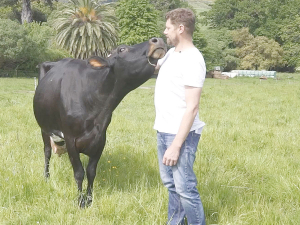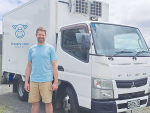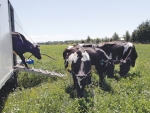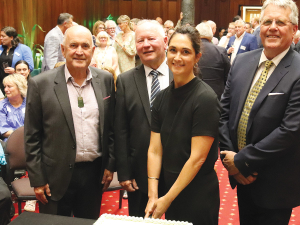A pioneer in small, local, low environmental-footprint milk supply hopes to have his "milk factory in a box" up and running and selling milk to the public by early November.
Christchurch-based Glen Herud has developed a system based on microprocessor-controlled pasteuriser/chillers contained in a "hub" beside a milking shed, and portable tanks which are connected to the hub for filling, pasteurisation and chilling.
The farmer then delivers the tanks to his network of retailers, which could be anything from corner stores and cafes to workplaces and schools. There, customers will bring their own containers for filling bhy internet-connected dispensers.
The prototype tanks are 60 litres, but they will be bigger in future, he says.
Herud says it means farmers don't have to hande the milk after filling the system, or worry about bottling.
"We call it our milk factory in a box, basically. That box complies with all the regulations around a milk factry. It's just you can't really fit a person inside it," says Herud.
"Our software basically steps the farmer through the process. They just click the button and the tank will pasteurise the milk and then cool it down."
Herud has announced that Chris Falconer, who milks 400 cows at Waerenga, North Waikato, is his first participating farmer. He is expected to be operating with a small number of cows by late October or early November. A Canterbury farmer may also be signed up by then.
"We're just finalising the MPI approval stuff at the moment," says Herud.
Trading as Happy Cow Milk, Herud has been publicly known for his efforts to establish what he calls "a more caring, kinder and fairer" dairy system. One of his principles was that calves should stay with their mothers until they wean naturally.
He first featured in the pages of Dairy News in 2016 when he was milking a small herd at Ohoka under a 15-metre custom trailer housing a milking machine with seven sets of cups, pasteuriser and bottling plant. He delivered milk under his Nature Matters brand, much of it in reusable glass bottles, to a small customer base including cafes and supermarkets. He also won an environmental award for the way the mobile plant could be taken to where the cows graze, to minimise pugging.
By 2018, however, he had to concede that it was too difficult and expensive to process and bottle milk on farm and distribute it efficiently at small scale.
“Everyone loved our milk but it was just very expensive to do it profitably. So we shut down.”
However, a loyal fan base supported him through donations for the next year and a half while he developed the new system.
A fundraising push in 2019 raised enough to prototype a working model. A second crowdfunding campaign a few weeks ago successfully raised more than $500,000 which he will use to scale the system for a working farm.
Herud says a regime of sampling and testing to ensure compliance is all part of the system.
“We use technology basically to take care of all the regulatory compliance, so that farmers don’t have to do that.
“There’s no bottling of milk or anything like that. So farmers are processing their milk efficiently.
“We supply their local retailers and cafes and so on with our milk dispensers, which connect to the internet and take care of all payment. Our system pays the farmer, pays the retailer, and charges the customer.
“So it’s an all-in-one system to basically enable farmers to supply their local market and to do it efficiently.”











